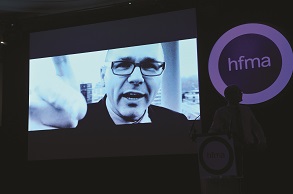Comment / NHS 70-100: a new hope
Battle lines have been drawn and all political parties have published their manifesto commitments outlining plans for the next parliamentary period 2017 to 2022. And therein lies the perpetual cyclical challenge for health and social care.
Responding to warnings about mounting pressures, each manifesto pledges more funding for the NHS up to 2022. But nobody is having a meaningful public debate on how we might take steps to ensure that the NHS remains fit for the next generation and the generation beyond that.
 The Five-year forward view and associated publications are very welcome and applauded. But as the NHS approaches its 70th anniversary next year, we need to lay the foundations now for its centenary celebration on 5 July 2048. The alternative is sleepwalking into a forward reality that incrementally assumes, at best, more of the same.
The Five-year forward view and associated publications are very welcome and applauded. But as the NHS approaches its 70th anniversary next year, we need to lay the foundations now for its centenary celebration on 5 July 2048. The alternative is sleepwalking into a forward reality that incrementally assumes, at best, more of the same.The problem is not simply that real-terms funding may remain broadly flat, nor necessarily the scope to continue to carve out further efficiency. The challenge lies in the assumption that alongside this we will sustain the current NHS ‘offer’ when official demographic estimates suggest a doubling of the number of us living over 80 years of age and a six-fold increase in the number of centenarians.
Beyond this election, public choices may need to be made as part of a 30-year forward view and that is why the UK would benefit from an independent cross-party review of the future of NHS and social care.
The outcome could either reaffirm Aneurin Bevan’s founding principles and offer the NHS a new hope – maybe, based on a set of publically consulted ‘conditions’ – or, seek public acceptance on a different health offer.
So, what could a set of ‘conditions’ look like? How could we possibly sustain the NHS founding principles in these circumstances? Here’s my starter for ten:
1. A relentless waste avoidance drive. If seeing is believing, taxpayers and the public need to be visibly assured that all services are as efficient as they can be.
2. Fully exploit NHS purchasing power at scale. The Carter report and other interventions such as agency market management are welcome first steps on this journey, but taxpayers expect much more.
3. Decide the best mechanism to deliver integrated health and social care to create a universal service across the whole public journey.
4. Move beyond the internal market – learning from the three UK devolved nations. Embed clinical commissioning, health intelligence and public health at the heart of population planning, and embrace value-based costing within service decision-making.
5. Create a single national IT dataset for patient and public health and care records.
6. Realistic workforce planning based on service design informed by consumerism and modern work/ life preferences.
7. Embrace the best of industry innovation importing skills and competencies to complement and support our health and care leaders.
8. Consult with the public on an honest three-way decision triangle between an outlook where: very significant taxation will be required to meet future need; public funded services are inevitably eroded over time; or, we enter into a public lifestyle ‘contract’ across a range of healthy-living must dos.
9. A modest national insurance contribution directly linked to health and care – after having taken all other demonstrable action – may be unavoidable, to fund latent demographic projections and poor health choices.
10. Explore devolution of the NHS and social care to a state-sponsored non-governmental body operating on a consumer-driven model outside the day-to-day remit of political intervention.
A debate around these issues has to be healthy in determining the future of our national health service, whichever party gains power on 8 June.
In the meantime, we all have a job to do, and that starts right at the top of this list by demonstrating efficiency beyond public doubt.
Contact the president on [email protected]
Related content
We are excited to bring you a fun packed Eastern Branch Conference in 2025 over three days.
This event is for those that will benefit from an overview of costing in the NHS or those new to costing and will cover why we cost and the processes.